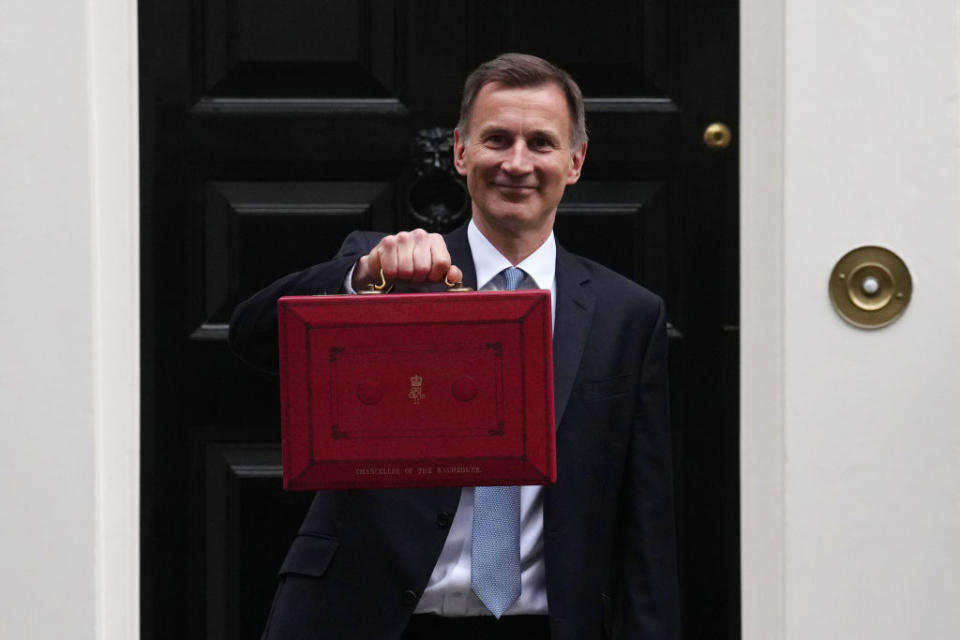Five things to look out for in Hunt’s Autumn statement

In just a few weeks time, Chancellor Jeremy Hunt will deliver his Autumn Statement to a packed Commons chamber.
While you can fill out your bingo card with a series of recurring announcements (fuel duty frozen for the 14th year, you say?) there could also be some more serious arguments – both political and economic – ahead.
Hunt could reportedly be set to quit as an MP – although the Surrey MP has strenuously denied the rumours.
And with whispers Prime Minister Rishi Sunak could install energy secretary and loyal ally Claire Coutinho in his stead, this Budget could be a key chance for Hunt to stamp his authority onto Treasury policy.
City A.M. takes you through the areas the government could seek to address before heading into next year…
Tax cuts
Jeremy Hunt is under heavy political pressure to cut taxes in the Autumn statement. Current forecasts predict taxes will continue rising during the rest of the parliament, with the total tax burden reaching nearly 37 per cent of national income by 2024.
This angers many right-wing Tory MPs, clustered around Liz Truss, who argue the Conservative party needs to be the party of low taxation.
Theoretically, tax cuts are possible. Thanks to fiscal drag, the public finances are in better shape than most had expected.
Public borrowing in the current financial year to date has come in £19.8bn lower than the OBR expected at this stage. And while most observers do not expect any significant reduction in the tax burden, that does not mean there are no rabbits in the hat.
As Ruth Gregory, deputy chief UK economy at Capital Economics said: “We doubt the Chancellor will be able to resist unveiling any pre-election sweeteners on 22nd November.”
So far Hunt has kept shtum. He recently warned that the fiscal position he faces this autumn “is worse than in the spring” suggesting that the situation “calls for prudence in the way we manage our public finances”.
And while number of Tories have repeatedly stressed that getting inflation under control is the first priority, but that does not mean there won’t be any sweeteners.
Triple lock
With inflation and wage growth rising at the highest levels in years, the government’s Triple Lock commitment is looking increasingly expensive and unsustainable.
Under current government policy, the state pension rises each April in line with whichever is highest of inflation, average wage increases or 2.5 per cent, in a bid to maintain its value.
At 8.5 per cent, the most recent wage growth data came in ahead of inflation, which was 6.7 per cent. This means the cost of the triple lock to the Treasury is expected to creep up by £2bn from an estimate made just six months ago and follows on from a 10.1 per cent increase in state pensions this year.
The Institute for Fiscal Studies estimate that maintaining the triple lock could add as much as £45bn a year to government spending by 2050.
The Treasury could adjust its calculations by linking pensions to wages excluding bonuses, which grew at a slower pace, but it would still be extremely expensive.
Investment
Hunt will use the Autumn statement to push forward his plans to get more pension money investing in UK start-ups and high growth businesses.
Earlier in the year ministers brokered a deal with nine pension firms, committing them to invest five per cent of assets in unlisted equities. The plans have faced some push-back from funds, and the Chancellor will unveil more detailed measures to assuage industry concerns.
At a recent speech, Hunt said the government would not push funds in a particular direction. Options on the table include merging funds or siphoning off savings to insurance specialists.
According to the Financial Times the government is also set to unveil a new investment vehicle, driven by the British Business Bank, to facilitate investments into high-growth private companies.
ISA overhaul
The Chancellor is reported to be considering a big shake-up of Individual Savings Accounts (ISAs) in an attempt to boost retail investment in the UK’s capital markets.
According to the Financial Times, Treasury officials have been in discussions with industry executives to discuss how to simplify ISA products.
One suggestion is enabling investors to hold both cash and stocks in one ISA account. Another is lifting the annual allowance, which has been stuck at £20,000 from 2017.
“A bigger allowance would be a shot in the arm for investors battered by cuts in the allowances for dividend tax and capital gains tax,” Sarah Coles, head of personal finance at Hargreaves Lansdown said.
Coles said lifting the allowance would also take away the need to develop UK-specific allowances because it would “automatically encourage” more investment in UK companies.
Back to work
The government is planning to use the Autumn statement to offer firms more incentives to provide occupational health benefits in an attempt to get more people back into work.
Since the pandemic, growing numbers of people have left the workforce due to long-term sickness. Recent data from the Society of Occupational Medicine (SOM) suggests one in 16 working-aged people in the UK – or around 2.5m – are “economically inactive” due to long-term sickness.
The move would be popular with a number of business groups, who have called for action on inactivity, which ensures that the labour market remains very tight.
Policies up for discussion include expanding benefit-in-kind rules and incentives for employers to hire those who have been out of work for a long time.
The government is reportedly considering tighter criteria on those claiming health benefits to encourage people back into work.
Mel Stride, Secretary of State for Work and Pensions, recently told MPs that “many people who are on out-of-work benefits due to a health condition want to work, and, assisted by modern working practices, they could do so while managing their condition effectively”.

 Yahoo Finance
Yahoo Finance 